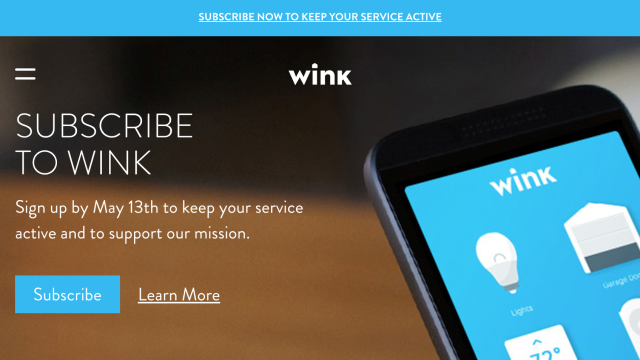Citing long-term costs and “recent economic events,” smart home hub maker Wink has announced in a blog that it’s switching to a mandatory $US5 ($8) per month subscription starting May 13. And as you might expect, the response from users has been less than thrilled. In fact, some have taken to social media accusing the company of downright extortion.
“Should you choose not to sign up for a subscription you will no longer be able to access your Wink devices from the app, with voice control or through the API, and your automations will be disabled on May 13,” the blog reads, confirming that users will now have to pay for services they once received for free or they’ll be left with useless devices. “Your device connections, settings and automations can be reactivated if you decide to subscribe at a later date.”
[referenced url=” thumb=” title=” excerpt=”]
On Reddit, several users have claimed the mandatory subscription after a mere 7 days’ notice is “ransom” and “close to extortion.” One Redditor wrote that they had “already tossed [theirs] in the trash.” Several others griped that Wink has already been spotty about updating its products for months and that the move was clearly a bid to squeeze customers for cash before the company goes under. That sentiment was echoed on Twitter, with many users pointing fingers at everything from musician Will.i.am—who acquired Wink in 2017 via his tech company i.am+—of running the company into the ground, to the broader issues plaguing the Internet of Things in general.
When we purchased our #wink hub the box clearly stated “NO MONTHLY FEES OR SUBSCRIPTIONS” #legal #smarthome Now you’re telling customers with just a weeks notice during a pandemic you’re shutting it off if you don’t pay a subscription fee. #extortion pic.twitter.com/ZJePD8lH89
— Dean Wiseman (@WiseMade) May 6, 2020
If you want to be generous, Wink’s move to a subscription model is hardly surprising. Given Wink’s already troubled finances, it makes sense that the economic hardships brought on by the global pandemic might finally do the beleaguered smart home company in—and that this truly is a last-ditch hail mary. As Gizmodo has reported before, a major reason smart home gadgets don’t last as long as their dumber counterparts is that long-term server and cloud maintenance costs aren’t fully offset by one-time hardware sales. And, it’s a problem Wink directly points to in its announcement.
That said, Wink’s announcement is totally tone-deaf. Giving customers a surprise ultimatum with only a week to comply, and no transition period is just a slap in the face. For people who completely bought into their system, and whose homes rely on their products, Wink’s announcement is like saying “Pay us or we brick your home” after months of arguably subpar service. It makes Wink’s claim that the fee was “designed to be as modest as possible” read more like a giant middle finger than an earnest explanation of dire circumstances.
The bit where Wink justifies the monthly subscription because it doesn’t sell user data to third parties is also insulting. It comes off as an attempt to guilt users into subscribing for “doing the right thing”—when really, the company’s at fault for having a poor business model.
In an ideal world, every smart home platform would guarantee users some basic functionality without subscriptions. While locking premium features behind subscriptions is annoying, that sort of arrangement would go a long way to preventing this exact situation. At the very least, Wink should’ve given users a lengthy transition period, especially considering buying gadgets right now isn’t feasible for everyone due to the global pandemic. Furthermore, some smart home products are genuinely a pain in the arse to replace—with hubs being decently high on that list.
Truthfully, there was no good way of doing this. Wink users were always going to be ticked off. That said, Wink could’ve easily been less of a jerk. Sonos, for example, recently announced it was sunsetting its older products and the backlash online was fierce enough that the company quickly apologised and agreed to continue providing security updates. But Sonos at the very least gave its users roughly four months’ notice and ample time to figure out what they wanted to do about the situation. Granted, Sonos and Wink’s financial situations aren’t the same—but then again, Wink’s problems didn’t crop up overnight. The Verge reported on the company’s slow death back in October, detailing seven-week salary delays, office closures, and dead customer support lines. It’s likely this was a long time coming and if that’s the case, Wink really doesn’t have an excuse for not trying to make a bitter pill easier to swallow.
